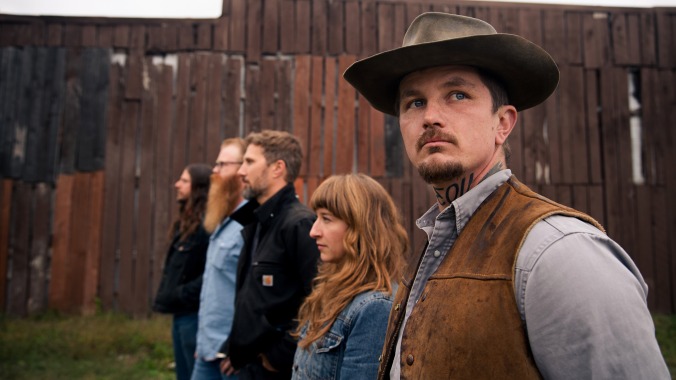The Scrappy Triumphs of the Lost Dog Street Band
Singer-songwriter Benjamin Tod discusses the grief, houselessness, train-hopping and industry doubts that informed his brand's brilliant, personal new album, Survived.
Photo by Starla Groves
In early January 2023 folk musician Benjamin Tod recorded a honky-tonk album. When he was done, left over on the cutting room floor were a handful of songs perfect for his Lost Dog Street Band, which he’d put on hiatus the previous October. Although Tod didn’t realize it at the time, he’d felt the band had run its course. “When we did our last show, I cried on stage. I did not know if I’d get back on stage again,” he says.
For years, Tod—known for his honest, raw stories about marginalization, addiction and anger—ran the band almost single-handedly, booking 1000-person shows and self-managing on an almost unimaginable scale. “Success worked our way out of the job, essentially,” he says. But, as he thought about the leftover songs, Tod decided to give his Lost Dog Street Band another go. Eager to hold onto the momentum, he booked more studio time and set out to reassemble a crew of players and write the rest of the album. He completed the final and title track, “Survived,” just a week before the band were due in the studio. Tod, his partner and fiddle player Ashley Mae, bassist Jeff Loops, drummer Ben Duval, banjoist Richard Bailey, Sparrows Pants and string-player John James Tourville got together at the Bomb Shelter in Nashville and hammered out a record in just a few weeks.
Tod spent his formative years hopping trains and traveling the country, depending on luck and gumption to keep him alive. Now sober and mostly settled down, the grit and harsh romance of those experiences infuses his music with a narrative depth that only comes from lived experience. Disenfranchised as he still is with most of the trappings of a civilized society, Tod’s music is, at times, exquisitely dark and callous. But as trite as it might sound, he’s also masterfully channeled his angst and a heavy helping of painful life experiences into songs that, like all the best stories, demand necessary self and social examination.
While Survived retains Tod’s signature intricate, brooding lyrical style, it often feels lighter than his previous work—a relief from the years of struggle and pain that brought it to be. Pairing guitar and fiddle with mandolin, the album begins with “Brighter Shade,” a love song written for Mae, before descending into requisite darkness in order to emerge on the other side, wrapping up with “Survived.” In an homage to the band’s tradition of including a dark waltz on each album, “Survived”—which Tod anoints the best song he’s ever written—ruminates on the nature of and human proclivity for suffering. “Hardship is inevitable. Struggle is inevitable. Suffering is a choice,” he says.
-

-

-

-

-

-

-

-

-

-

-

-

-

-

-

-

-

-

-

-

-

-

-

-

-

-

-

-

-

-

-

-

-

-

-

-

-

-

-

-








































